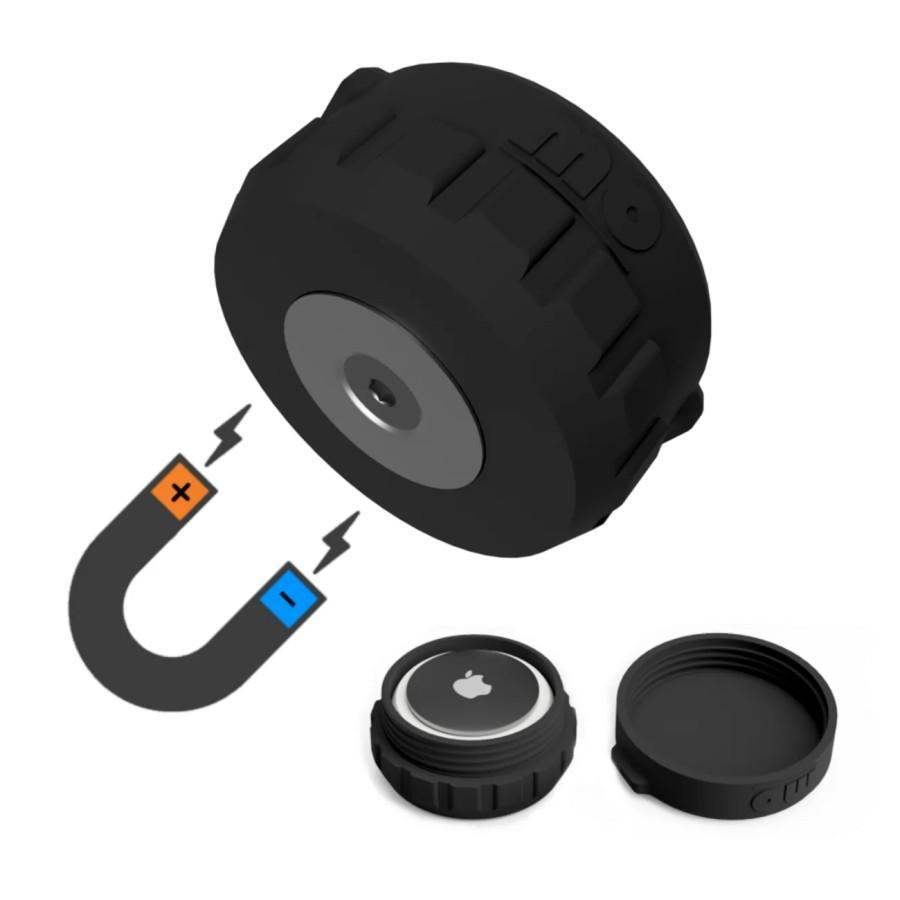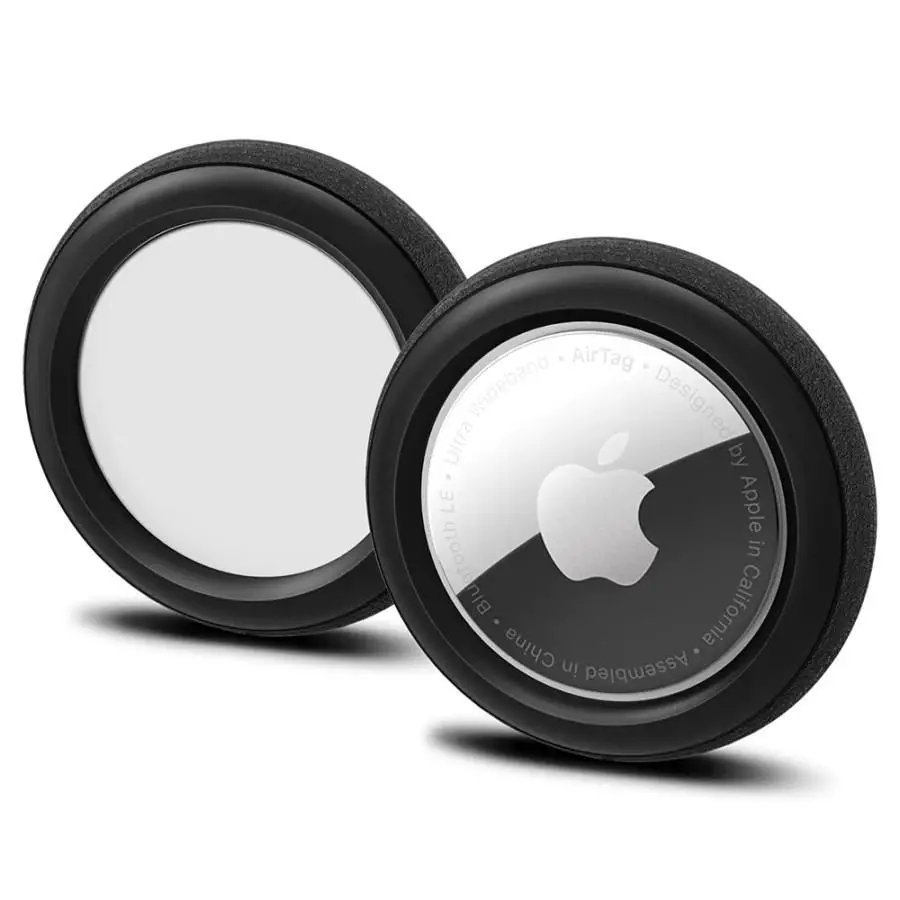In the world of tech gadgets, few innovations have managed to get the applause of the masses like Apple’s AirTags. These tiny location trackers have revolutionized the way we keep track of our personal belongings, from keys and wallets to backpacks and more. You can even attach AirTag Collar to your Pet’s neck to make sure they are not lost anywhere when they go out for a run. However, as with any new technology, questions and misconceptions arise. One common question that everyone has that frequently pops up is whether magnets affect AirTags. In this article, I will help put some insight into this topic and provide you with a comprehensive understanding of how magnets are related to AirTags, and how they affect them.
AirTags and Their Magnetic Component
AirTags come equipped with a small magnet inside their built-in speaker. This magnet primarily keeps the Airtag from moving around or getting shaken out of a metal surface. This design feature is particularly useful for ensuring that AirTags can stay securely attached to magnetic or metal surfaces. The small magnet, however, doesn’t impact AirTags in any other significant way.
So, the answer the to question “Do Magnets Affect AirTags” is No, magnets don’t affect AirTags in any way other than helping them to stick well to the surface.

The Unique Role of AirTags
Apple AirTags’s inception started in April 2021, it was a groundbreaking solution for the age-old problem of losing personal items that easily slip off or get misplaced. This affordable tracking device has found its way into the daily lives of countless individuals, providing a practical means of safeguarding their belongings. AirTags offer various usage scenarios, allowing users to tuck them into purses, or backpacks, or attach them to surfaces. However, AirTags themselves lack any adhesive on their back. Thus, there is a small magnet fixed inside so that it can stick well to metal surfaces. The magnet is not very strong though. If you have a fear of your AirTag slipping off, it is better to get an AirTag holder or case.
Airtag’s Magnet Attachment
While the magnet inside AirTags does facilitate attachment to metal surfaces, it’s crucial to understand that this attachment is not particularly robust. The magnet’s effect is relatively fragile, and without additional support, an Airtag may easily slip off a surface, especially if it experiences significant movement or shaking. To ensure a secure attachment with magnets, you’ll need to employ magnetic cases specially designed for AirTags. These cases feature stronger magnets that firmly keep the Airtag in place. You can get them on Amazon easily.
Are AirTags Magnetic by Nature?
No, AirTags are not magnetic by nature. However, there is a small magnet fitted inside just for sticking to metal surface purposes. The magnet inside an Airtag is tiny and not powerful enough to have magnetic properties. Apart from this small magnet, AirTags lack any magnets on their back, which means they cannot be labeled as magnetic gadgets.
AirTags are crafted from polished stainless steel, resulting in a smooth surface. The market offers a range of magnetic cases designed specifically for AirTags, making it easy to attach them securely to various metal surfaces.
You can also read this answer provided by an Apple Customer in regards to the same question. And his response was quite the same when talking with Customer service and Apple support.
Does AirTag Affect Credit Cards?
A common concern related to AirTags is whether they can demagnetize or otherwise affect cards such as credit cards, identity cards, and RFID cards. Fortunately, AirTags are designed to operate without causing any interference or damage to cards. AirTags employ low-energy Bluetooth and Ultra-Wideband technology to send and receive signals. These technologies do not generate magnetic fields that could affect the magnetic strips on certain cards. In fact, most credit cards no longer feature magnetic strips, making them immune to any potential magnetic interference. Moreover, the frequency at which AirTags and credit cards operate differs, ensuring that they do not interfere with one another when placed together in a wallet or a cardholder.
Do RFID Blockers Stop AirTags to Work?
RFID is a radio signal that is often emitted by RFID cards. RFID-blocking wallets have become increasingly popular for protecting cards like credit cards that use RFID technology. These wallets contain RFID blockers.
Before buying an AirTag, many users have this question whether RFID Blockers block AirTags’ signals as well which prevents it from working properly?
The short answer is No!
Let’s get to know about this in a bit of detail and know why RFID blockers don’t affect AirTag.
Can RFID Blockers also stop AirTags?
The good news is that RFID-blocking wallets, when used to store AirTags, do not interfere with the functionality of AirTags. This is because AirTags rely on a combination of low-energy Bluetooth and Ultra-Wideband technology for sending location signals. There is no creation of any magnetic field. These technologies operate on different radio frequency bands than those used by credit card chips. As a result, RFID blockers do not affect the Airtag’s ability to transmit its location signal from within an RFID-blocking wallet.
The Technical Details: Ranges and Frequencies
To better understand how AirTags and RFID blockers coexist without interference, let’s take a closer look at the ranges and radio frequencies of various components:
| Technology | Frequency Range |
| RFID (Radio-Frequency Identification) | 300 MHz to 960 MHz |
| Apple AirTag (Low Energy Bluetooth) | 2.4 GHz |
| Apple AirTag (Ultra-Wideband) | 3.1 GHz to 10.6 GHz |
These distinct frequency ranges ensure that various technologies can coexist without causing interference or disruption when placed in close proximity to each other. Thus, RFID blockers don’t interfere with AirTags.

AirTags: Are They Sticky?
One important clarification is that AirTags themselves are not inherently sticky. They lack any adhesive on their back, which means they cannot be attached to surfaces without additional aids. Instead, as a user you have the option to purchase AirTag cases that come equipped with strong adhesives on the back. These cases are available both from Apple and various third-party brands.
The strong adhesive on these cases ensures that the Airtag remains securely attached to the chosen surface. It’s important to note that the adhesive in these cases works on a one-to-one basis. In other words, once you remove the case from a specific item, the adhesive won’t effectively reattach the Airtag to another surface. Therefore, while AirTags can be securely attached with the aid of cases, they do not possess inherent stickiness.
How to Attach an AirTag With An Adhesive Back?
If you’re looking to attach an Airtag to a surface using an adhesive back case, here’s a simple guide to follow:
Step-by-step guide
- Unbox your AirTag and remove the plastic cover, which will trigger a starting sound.
- Set up your Airtag and connect it to your iPhone following the provided instructions.
- Take the adhesive back case designed for the Airtag and insert your Airtag into it.
- Remove the cover from the adhesive part of the case and firmly attach it to the surface or item you wish to track, ensuring a secure connection.
- With these steps, your Airtag will be properly attached to the chosen surface, providing you with a reliable tracking solution.
Conclusion
AirTags have a small magnet inside, primarily designed to facilitate attachment to metal surfaces. This magnet’s effect, however, is relatively fragile, and to securely attach AirTags to magnetic or metal surfaces, it’s advisable to use magnetic cases with stronger magnets. AirTags themselves are not inherently magnetic, and they rely on these cases for stable attachment.
Moreover, AirTags do not affect cards like credit cards and RFID cards. They use distinct technologies and frequencies that do not interfere with one another, allowing them to coexist in a wallet without issue.







Add Comment